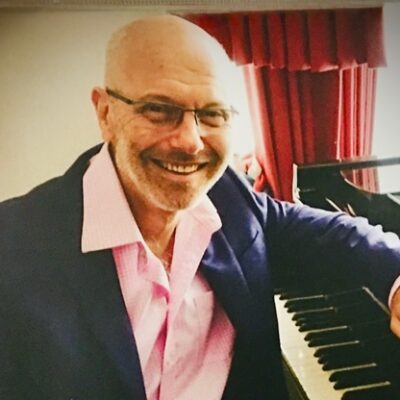Andrew Gellert
The piano has always been central to my life; it carries deep personal significance. My very name was a tribute by my parents to my uncle, Andrej, a most accomplished jazz pianist who perished in Auschwitz in 1942, playing in the camp orchestra under the “Arbeit Macht Frei” sign. The piano was also a precious connection with my mother. Devastating depression tormented her, but the piano would restore her, allowing her to sit beside me and listen.
Born in Kenya in 1953 to Hungarian-Czechoslovak parents who escaped the Holocaust in 1939, I grew up surrounded by music. As a child, I sat by the radiogram, listening to Liszt’s Hungarian Rhapsodies performed by Louis Kentner. I still have that LP record. By four, I had started piano lessons, and at twelve, I was sent to England to boarding school, where I continued developing my love for the piano. I would eat lunch in a rush so that most of the lunch hour could be spent at the keyboard.
Despite my music, I pursued medicine, deeply inspired by my father, a dedicated and exceptional GP in Kenya. At seventeen, I started medical school in London where I met my wife, Selina, in 1972, and later specialised in chest medicine. Throughout my career, except for when I was a student, I continued piano lessons and earned my LRAM (Licentiate of the Royal Academy of Music) in 1984. However, the demands of hospital medicine were challenging. Senior consultants disapproved then of a serious parallel interest. But forsaking the piano was never an option.
This tension was one factor that contributed to my shift to general practice, where attitudes were more tolerant. But in truth, I had always wanted to be a family doctor. Following in my revered father‘s footsteps, and teaching students and trainees, was a calling; it was an honour to be entrusted with patients’ life stories and to engage with learners. Medicine was demanding, yet the piano was a constant. Every morning before work and every evening afterwards, I played. At home, I first had one and later two cherished grand pianos: a Steinway B grand and later a Yamaha, the former purchased with our first house in 1983 for £12,500 — now it would cost around £125,000 new!
I retired from practice in 2013, and from teaching in 2015, allowing me to dedicate myself fully to the piano. Circle Square’s “Planning Your Next Chapter” programme helped give me the confidence and belief to follow my dream. I began performing charity concerts, including a special concert in our synagogue in 2018 to commemorate 100 years since the end of World War I. When COVID disrupted this, I started recording videos, introducing each work, and then performing it. I sent each video to about 300 family members and friends, creating an archive. The most recent was for this year’s Holocaust Memorial Day — which I dedicated to my uncle and namesake.
Though I sometimes wonder what might have been had I pursued a career in music, I have no regrets. Medicine and teaching enriched my life immeasurably, and now, in my later years, I have the privilege of playing without the pressure of earning a living from it. This preserves the sacredness of my relationship with the piano.
Today, I continue to push myself musically, working with three teachers in London and one via Zoom in New York. I may dedicate 1-2 years to working on a single piece, to try and reach as high as standard as I can. One memorable live performance was playing one of Liszt’s Hungarian Rhapsodies for my parents on their 50th wedding anniversary in 1984 – the piece on that LP that I first loved when I was four.
Age presents challenges. A hand operation due in April this year will determine my ability to continue to play, but I remain hopeful. My surgeon specialises in operating on musicians and he is optimistic. There is still much I wish to accomplish — more Beethoven, Liszt and Chopin.
Retirement is a gift, a time to embrace what you love. My advice to others is to throw your arms around what that is for you and to pursue it with everything you have. Of course, a supportive and loving spouse makes all the difference!
Circle Square Q&A
What 3 words best describe you? Generous, Compassionate, Rigorous.
If you could offer your younger self one piece of advice, what would that be? Be kinder to yourself.
What do you consider to be your greatest achievement? Following my heart and moving to General Practice in the 1980s.
Which person (dead or alive) would you most like to invite to dinner? Two please! Fryderyk Chopin and my late uncle, Andrej Gellert.
How has age strengthened your advantage? Recognising when to be silent and when to speak up.
What inspired you to join Circle Square? When I retired, I struggled with my identity without medicine. Circle Square was important in using this opportunity to flourish anew.


